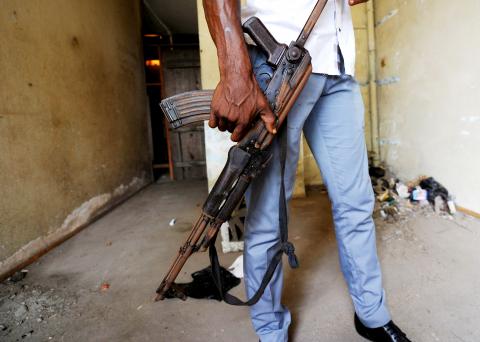Keen to hire a Kalashnikov for the day? In a dangerous legacy of years of conflict, the Ivory Coast’s economic capital is now the hub of a thriving trade in automatic weapons for the criminal underworld.
“The ‘Kalash’ rules the streets in Abidjan,” said a police officer who is part of a task force charged with fighting gangland crime.
Criminals bent on a heist can rent an assault rifle for US$37.

Photo: AFP
In one working-class district, a dealer who calls himself Commander Tasman, or “fire” in the Malinke language, runs a veritable clandestine armory out back of his store. The beefy trader in dark glasses proudly showed off a “Kalash” and announced his rates.
If 20,000 CFA francs (US$37) is the going rate for renting an assault rifle, an automatic pistol can be had for US$30 a day. A Kalashnikov costs between US$282 and US$368 to buy. Tasman said that he can even provide rocket launchers, for 500,000 CFA francs each.
The arms dealer was among those who fought for Ivory Coast President Alassane Ouattara during the crisis that lasted between December 2010 and April last year, which flared up when outgoing president Laurent Gbagbo refused to acknowledge defeat in an election.
This epilogue to a decade of political turmoil and armed confrontation in the West African country ended with 10 days of street warfare in Abidjan that claimed about 3,000 lives.
It also led to an unprecedented proliferation of weapons of all kinds, in violation of a 2004 arms embargo decreed by the UN.
Tens of thousands of guns are believed still to be in circulation, in the absence of any official figures.
While Abidjan is a much safer place than it was during the crisis, the number of weapons at large worries the authorities but is seen as a boon by gangs of highwaymen, who are particularly active in the north of the country.
Three raids by unidentified gunmen on a police station, an army post and a military base in Abidjan on Sunday last week and on Monday left at least 11 soldiers dead and as many wounded.
A national commission set up in 2009 to fight the proliferation of light and small caliber weapons, COMNAT, has tried to have former fighters voluntarily hand in their guns, with the backing of the UN Operation in Ivory Coast (ONUCI).
“The country doesn’t need this any more, we are emerging from the crisis. What everybody should work for now is the rebuilding of the country,” General Desire Adjoussou said last month at a ceremony to destroy collected weapons in Abidjan.
However, barely more than 2,000 weapons had been collected up until then and stored by ONUCI.
“We took up arms during the battle of Abidjan, but very few people turned them in,” said “Jagger,” a former pro-Gbagbo militiaman turned butcher.
“My weapon is a souvenir,” he said from behind his stall.
Another former militiaman, who has become a security guard in an upmarket district, decided to bury the Kalashnikovs he and his companions used in the fighting in a patch of wasteland. He was reluctant to turn them in for fear of being identified and punished by the army.
Adama, who fought for Ouattara, argued that the state of the country has become too uncertain to get rid of his “machine.”
“People talk more and more of a possible comeback by Gbagbo and [the crisis] could start again,” he said.
A hearing to confirm the charges of crimes against humanity hanging over the ousted president, currently detained by the International Criminal Court in the Hague, was set to begin tomorrow, but has been postponed pending a medical evaluation.
In Ivory Coast, some fear and others hope for Gbagbo’s release.
Yet one thing is certain: former fighters would waste their time if they waited for the authorities to buy back their weapons, as was once proposed.
There is “no question” of this, General Adjoussou said, because “it would encourage the trafficking.”
On the other hand, the thousands of ex-combatants are meant to take part in a future disarmament, demobilization and social reinsertion program promoted by ONUCI and Ivory Coast’s foreign partners.
The government has promised to launch the program, but it has yet to begin.

NO EXCUSES: Marcos said his administration was acting on voters’ demands, but an academic said the move was emotionally motivated after a poor midterm showing Philippine President Ferdinand Marcos Jr yesterday sought the resignation of all his Cabinet secretaries, in a move seen as an attempt to reset the political agenda and assert his authority over the second half of his single six-year term. The order came after the president’s allies failed to win a majority of Senate seats contested in the 12 polls on Monday last week, leaving Marcos facing a divided political and legislative landscape that could thwart his attempts to have an ally succeed him in 2028. “He’s talking to the people, trying to salvage whatever political capital he has left. I think it’s

Polish presidential candidates offered different visions of Poland and its relations with Ukraine in a televised debate ahead of next week’s run-off, which remains on a knife-edge. During a head-to-head debate lasting two hours, centrist Warsaw Mayor Rafal Trzaskowski, from Polish Prime Minister Donald Tusk’s governing pro-European coalition, faced the Eurosceptic historian Karol Nawrocki, backed by the right-wing populist Law and Justice party (PiS). The two candidates, who qualified for the second round after coming in the top two places in the first vote on Sunday last week, clashed over Poland’s relations with Ukraine, EU policy and the track records of their

UNSCHEDULED VISIT: ‘It’s a very bulky new neighbor, but it will soon go away,’ said Johan Helberg of the 135m container ship that run aground near his house A man in Norway awoke early on Thursday to discover a huge container ship had run aground a stone’s throw from his fjord-side house — and he had slept through the commotion. For an as-yet unknown reason, the 135m NCL Salten sailed up onto shore just meters from Johan Helberg’s house in a fjord near Trondheim in central Norway. Helberg only discovered the unexpected visitor when a panicked neighbor who had rung his doorbell repeatedly to no avail gave up and called him on the phone. “The doorbell rang at a time of day when I don’t like to open,” Helberg told television

A team of doctors and vets in Pakistan has developed a novel treatment for a pair of elephants with tuberculosis (TB) that involves feeding them at least 400 pills a day. The jumbo effort at the Karachi Safari Park involves administering the tablets — the same as those used to treat TB in humans — hidden inside food ranging from apples and bananas, to Pakistani sweets. The amount of medication is adjusted to account for the weight of the 4,000kg elephants. However, it has taken Madhubala and Malika several weeks to settle into the treatment after spitting out the first few doses they